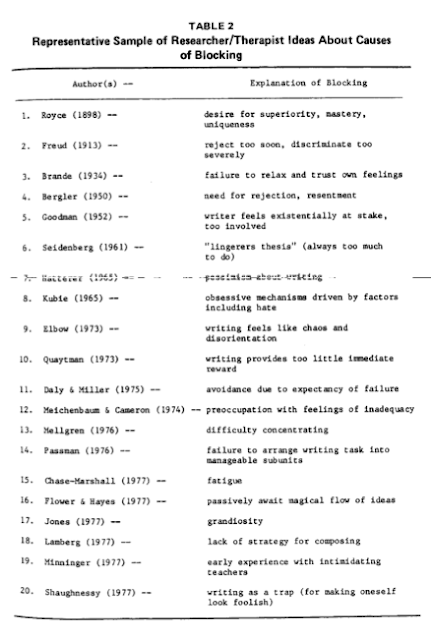Why do professors write? According to Boice, professors write because writing:
Weighs heavily in hiring, promotion, tenure
Brings rewards of visibility, membership in the profession
Provides a kind of self-education – you don‟t really know the field until you write about it
That last bit seems significant to me. I spent three years working at a university with a 4/4 load. Of the more than a dozen colleagues in my department, you could identify the ones who still wrote. They were the best teachers, the most engaged colleagues, and the ones, frankly, who still liked their job. Nicholas Karolides, Marshall Toman, Ruth Wood, Steve Luebke, I am looking especially at you, and I thank you for your friendship and collegial example.
Digression: Some significant portion of those colleagues, I think, had even stopped reading, except recreationally. After all, they had gardens to tend by 3pm each day. In a small town, some of these colleagues caused a scandal, and complaints from the locals, such that each faculty member was asked to submit a "schedule" verifying how they were spending at least 40 hours a week on their work. I honestly don't believe they all were -- but then, one of my colleagues would walk into class every Friday, announce that it was a "reading day," and then head to the faculty lounge to get coffee. No wonder tenure seems... uncomfortable to some nonacademic people.Boice also claims that 85% of publication is done by 15% of those in the profession. I'm going to push at this a little bit because I think that there are some members of the profession who still write but in nonacademic forums -- Tom Zelman and Pat Hagen, who write popular book reviews, stay alive to their profession without putting all their energy into peer reviewed pieces. I don't want to define publication too narrowly.
Still, this assertion matches my memory of an article comparing Communication faculty (one of my areas of disciplinary identification) dissertations against publications. In "Normative Publication Productivity of Communication Scholars at Selected Career Milestones," Timothy Stephen and Renee Geel, Human Communication Research, Volume 33, Issue 1, pages 103–118, January 2007, we learn that "more than one third of the membership of the scholars sample had not contributed any articles to the field’s mainline periodical literature." The sum total contribution of many within the 2/3 who do publish? One article.
Writing is rewarded and rewarding, Boice is right, but it is not often enough done.
Why not?
In a 1985 Article, Boice surveyed some theories, which I will reproduce below.
Do you see your own reluctance to write in this?


No comments:
Post a Comment